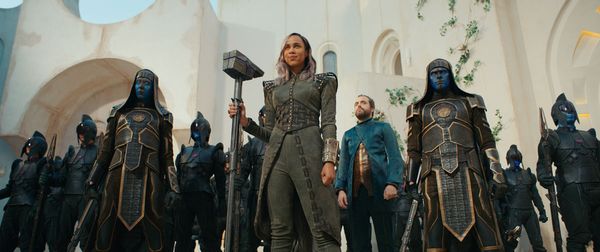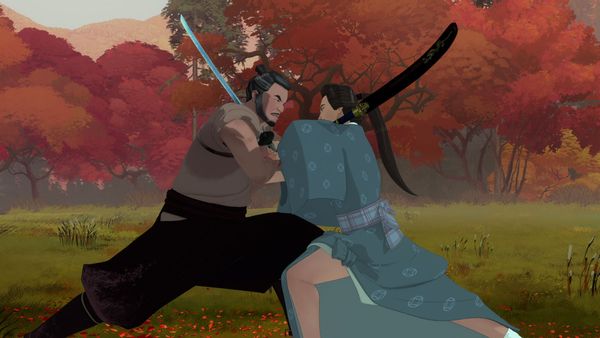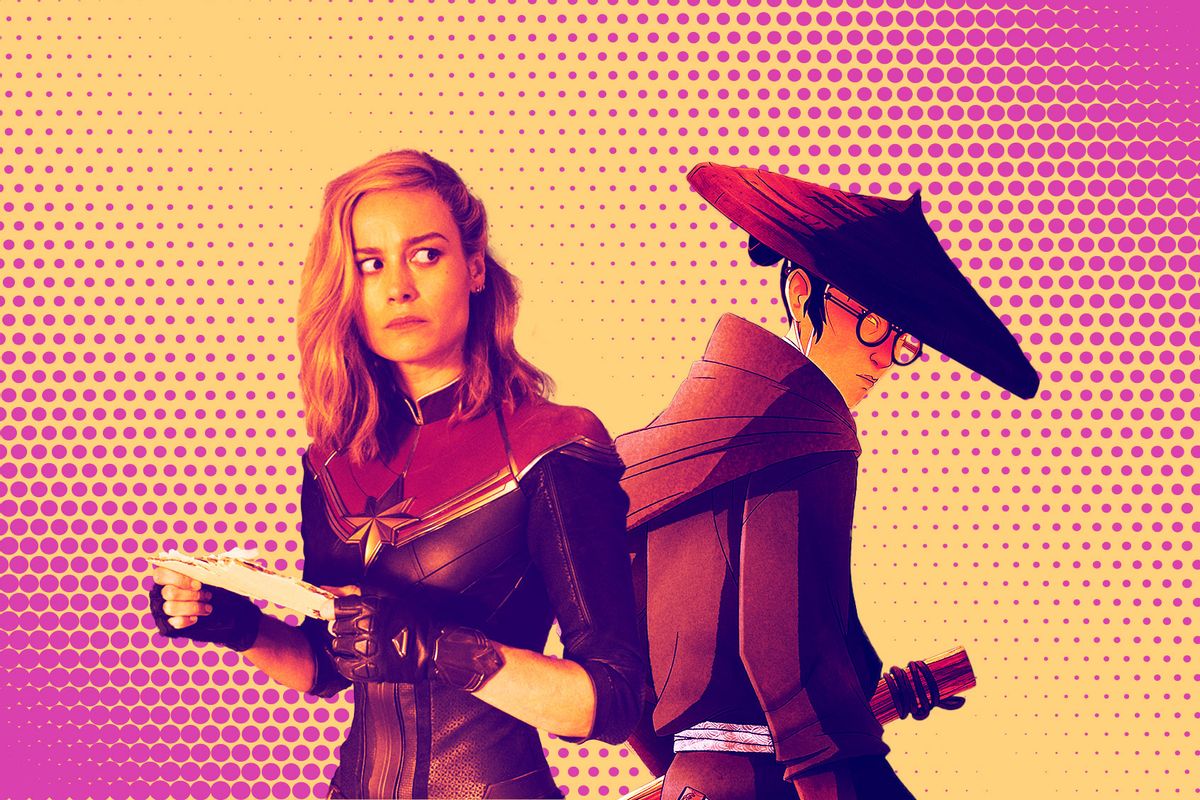What one person defines as catering is another’s example of pandering. No moment in the MCU’s movie library illustrates this better than the few moments at the close of “Avengers: Endgame” when the women of the MCU pull together to lend Captain Marvel (Brie Larson) assistance she obviously doesn’t need.
To jog your memory, Carol Danvers made her grand entrance by singlehandedly destroying a ship the size of a large city's downtown area. Everyone sees her do this. It’s fire! Yet when the cosmically charged woman takes over the Avengers’ high-stakes mission of Keep Away from little Peter Parker, who generally has a strong grasp of empirical evidence, he stares at an oncoming horde of meat-based creatures and says, “I don’t know how you’re gonna get through all that.”
Anthony and Joe Russo inserted this as “girl power” fan service, an homage to the handful of female heroes out of which only one at that point had headlined a movie. And that rock star of the Marvel universe almost wrestled the villainous titan of the Infinity Saga into submission . . . almost.
Tony Stark was always going to save the universe at the game's end, not Captain Marvel. If not him, then Thor or Captain America or any of the male Avengers developed over a series of sequels. Practical reasons come into consideration of course; Robert Downey, Jr. was ready to exit after spending a decade with the franchise. “Iron Man” lit the MCU match, so sending him off with a glorious sacrifice provides a spiritually symmetrical ending.
Such explanations also mask an irritating tendency to avoid showing superwomen physically subduing male opponents. This device is particularly rampant in Marvel, which either pits women against other women or casts them as battle assistants to men.
“The Marvels” doesn’t break this streak, sending Carol, Monica Rambeau (Teyonah Parris) and Kamala Khan (Iman Vellani) up against one of the franchise’s more forgettable heels, Dar-Benn (Zawe Ashton). The MCU has featured other antagonists with understandable motivations; Dar-Benn by another name might have been called Killmonger the Second.
But the Black Panther’s first archnemesis was allowed a measure of complexity, whereas Ashton’s Kree terrorist is mainly there to have an acceptable opponent with whom the film’s trio can fight.
 Zawe Ashton as Dar-Benn and Daniel Ings as Ty-Rone in "The Marvels" (Photo courtesy of Marvel Studios)This is commonplace in the MCU. “Black Panther: Wakanda Forever” allows Namor to avoid being beaten into submission by impaling Shuri while she wears the Black Panther suit. She gets him to yield by cooking him in the engine blasts on her crashed ship.
Zawe Ashton as Dar-Benn and Daniel Ings as Ty-Rone in "The Marvels" (Photo courtesy of Marvel Studios)This is commonplace in the MCU. “Black Panther: Wakanda Forever” allows Namor to avoid being beaten into submission by impaling Shuri while she wears the Black Panther suit. She gets him to yield by cooking him in the engine blasts on her crashed ship.
The MCU loves to use combustion to helps its women defeat male adversaries, even ones who are not enhanced in any way. In her eponymously titled movie Black Widow faces down the manipulative boss brainwashing women into being killers, but gets hauled off by the mean girl tribe before she can permanently retire him with her fists. Her sister takes care of him by blowing up the helicopter in which he’s escaping.
Turn the tables, as “Thor: Ragnarok” does, and the cliché has a similar flavor. Cate Blanchett’s Hela is stronger than Thor, but technically she doesn’t defeat him. His exploding home world does her in, leaving the God of Thunder’s wrestling record more or less unblemished.
Empowerment fantasies should not require women to out-violent men, but this a genre defined by might and dominated by people punching through problems (more to its detriment these days). Audiences notice these gender divisions, which impacts our consideration for the characters most frequently shortchanged.
We need your help to stay independent
A bigger puzzle is why this trope abides after 33 movies. One rationalization is obvious, in that for years comic books not only sexualized their women characters but victimized them. Decades of men writing these stories yielded scores of frames showing champions biffing unruly women in the face, as Batman’s done on more than one occasion. He's a DC character, not a Marvel concern – that publisher has its own object of debate in the periodical version of Hank Pym who, unlike his kindly Michael Douglas incarnation, is known for having struck his wife Janet in a rage.
TV and film writers don’t generally have a problem with men ganging up on superwomen, as long as those women are secondary figures. It’s when they’re better than exemplary male characters that those match-ups become a problem. And this lesson comes not from Marvel’s latest TV show or movie, but from the Netflix fable “Blue Eye Samurai.”
This animated series follows a standard hero’s quest, with its 17th-century half-white, half-Japanese ronin Mizu (Maya Erskine) hunting a quartet of white men she’s vowed vengeance against for making her an outcast in a society defined by racial purity. One of them is her father, but all of them are destructive, murderous criminals.
From a young age and at her mother’s insistence, Mizu lived as a man. But she only stops doing this when she is reunited with her mother, who after a point Mizu presumes to be dead. To save them both from destitution, her parent betroths Mizu to a disgraced samurai raising horses for a local lord. The episode recounting their love story, "The Tale of the Ronin and the Bride," flips on its ear when Mizu’s husband, who professes to accept her for who she is, invites her to show him her sword fighting skills.
 Byron Mann as Mikio and Maya Erskine as Mizu in "Blue Eye Samurai" (Netflix)
Byron Mann as Mikio and Maya Erskine as Mizu in "Blue Eye Samurai" (Netflix)
She doesn't hold back, eager to display her extraordinary agility and precision; her victory is not even close. Instead of being amazed or proud of his wife, Mizu's husband declares her to be monstrous. Relevant to the story is the fact that she defeats him while wearing a kimono, dressed like a respectable woman of the Edo era. Before this, and in the duel's aftermath, Mizu moves through the world as a man, is challenged as a man and builds her legend under the assumption that she’s male. Her strength and skill aren’t questioned, and neither is the honor of those facing her.
Want a daily wrap-up of all the news and commentary Salon has to offer? Subscribe to our morning newsletter, Crash Course.
But the lesson she learns in this lovers' match, written by series co-creator Amber Noizumi, is a transparent window into a way of thinking that delineates who gets to be physically capable and heroic, and more than this, who can be exceptional.
Noizumi’s husband Michael Green wrote for NBC's “Heroes” and was a showrunner on the first season of “American Gods” (i.e. the watchable one), two credits proving his experience with genre gatekeepers dimming the blaze of certain characters. Joining Noizumi in refracting that longstanding tendency into a hero that learns from the world’s sexist wounding to become more formidable, makes the show a masterful example of a mythical heroine whose ferocity defies minimizing or dismissal.
No excuses or assumptions are attached to her victories, and her status as her time’s best duelist is mentioned without categorization. She is accepted as the best in a time when nearly every known person in her field is a man. Audiences embrace this story because it acknowledges that if she presented as a woman, the world would treat her differently. Evidence of that fact abounds on TV and in theaters, doesn’t it?
"The Marvels" is now playing theaters. "Blue Eye Samurai" streams on Netflix.
Read more
about this topic

Shares